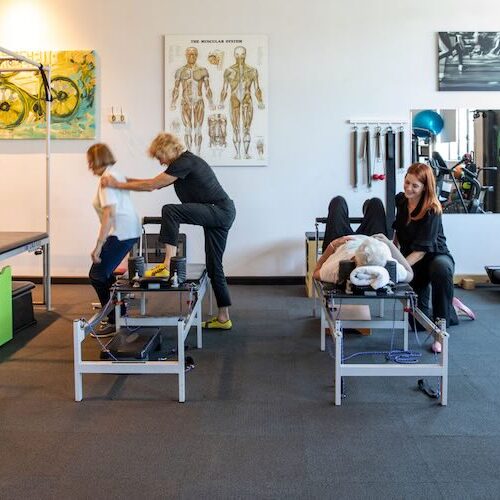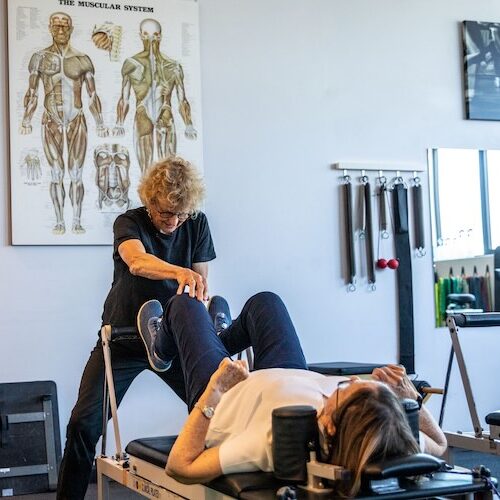Book a Physio for Women's Health Issues
Our women’s health physiotherapy is delivered by our experienced team, including Principal Physiotherapist Karen Westcott (special interest in women’s health, musculoskeletal and spinal care), supported by APA Titled Musculoskeletal Physiotherapist Jan Sargood, Principal Physiotherapist Kam Bhabra, and Physiotherapists Niamh Davies and Gurasees Bajwa. Together, they combine decades of experience across hospital, community, and private practice settings.
We work closely with GPs, specialists, and other allied health professionals to ensure your care is seamless and holistic.
Book your appointment today and take the next step toward feeling strong, confident, and supported.
You’ll find us at:
- Mon – Tue: 7:00 AM – 7:00 PM
- Wed: 7:00 AM – 7:30 PM
- Thu: 7:00 AM – 6:00 PM
- Fri: 7:00 AM – 4:00 PM
- Sat: 8:00 AM – 1:00 PM
- Sun: Closed

Women's Health Issues We Treat
Our women’s health physiotherapy covers a wide range of conditions and life stages:
- Symptoms: Heaviness, leakage, poor bladder or bowel control, difficulty engaging core muscles.
- Common Causes: Pregnancy, childbirth, menopause, surgery, chronic constipation, or repetitive heavy lifting.
- Physio Approach: Pelvic floor assessments (including real-time ultrasound), targeted strengthening programs, and lifestyle education.
- Expected Outcomes: Improved pelvic floor strength, continence, and core stability with better long-term pelvic health.
- Symptoms: Leakage with coughing, sneezing, or exercise; urgency; frequent urination.
- Common Causes: Weak pelvic floor muscles, childbirth, menopause, surgery, or high-impact activity.
- Physio Approach: Pelvic floor muscle retraining, bladder training programs, biofeedback, and bladder control strategies.
- Expected Outcomes: Reduced leakage, improved bladder control, and restored confidence in daily activities.
- Symptoms: Abdominal separation, weakness through the core, back or pelvic pain, reduced stability, incontinence.
- Common Causes: Pregnancy-related stretching of abdominal muscles, caesarean section recovery, or inadequate postnatal rehabilitation.
- Physio Approach: Core and pelvic floor rehabilitation, progressive exercise programs, postural retraining, and safe return-to-exercise planning.
- Expected Outcomes: Restored abdominal and pelvic floor strength, reduced pain, safe return to daily activity, and prevention of long-term complications.
Initial Consultation: $160
Review Assessment and Consultation: $155
Standard Consultation: $125
Please note: A cancellation fee of $83 applies for cancellations within 24 hours of the scheduled appointment. Private health rebate applicable.
Ongoing Rehab & Exercise Classes for Women's Health
In addition to one-on-one physiotherapy, Lilyfield Physio offers group rehab and exercise classes designed to support your long-term health. These classes focus on building strength, improving mobility, correcting movement patterns, and maintaining joint resilience.
With a wide range of class types and convenient times, there’s plenty of opportunity to continue progressing safely under expert guidance.
Ready to Feel Supported with Women’s Health Physio?
If pain, discomfort, or pelvic health issues are impacting your quality of life, our dedicated women’s health physiotherapists at Lilyfield Physio are here to help. Book your appointment online today and take the first step toward restoring strength, balance, and confidence.

Our Approach to Women's Health Physiotherapy
We combine hands-on therapy, exercise, and education to address both symptoms and root causes:
- Pelvic Floor & Core Training: Evidence-based programs to improve continence, stability, and strength.
- Manual Therapy: Gentle joint mobilisation, soft-tissue release, and pain-relieving techniques.
- Pilates & Clinical Exercise: Targeted whole-body strengthening with a focus on safe, functional movement.
- Education & Lifestyle Support: Guidance on posture, lifting techniques, return-to-sport planning, and activity modifications.
- Bone Health Programs: Bone-loading, resistance, and balance exercises to prevent and manage osteoporosis.
- Personalised Recovery Plans: Each program is tailored to your stage of life, symptoms, and goals.
With ongoing support and regular progress reviews, our aim is to help you feel strong, supported, and empowered to live life fully – without being held back by pain or pelvic health concerns.
Benefits of Women's Health Physiotherapy
Women’s health physiotherapy provides both immediate relief and long-term improvements to quality of life, including:
- Improved Pelvic Floor Function: Restore strength and coordination for better bladder and bowel control.
- Reduced Pain and Discomfort: Relieve pelvic, lower back, or musculoskeletal pain linked to pregnancy, postpartum recovery, or menopause.
- Enhanced Postnatal Recovery: Support safe healing after childbirth, including management of diastasis recti and return to exercise.
- Management of Incontinence: Minimise symptoms, reduce progression, and maintain an active lifestyle.
- Support During Hormonal Changes: Improve bone strength, flexibility, and confidence during perimenopause and menopause.
- Guidance Through Life Stages: Receive individualised advice and programs that adapt to your body’s needs at each stage of life.
- Increased Confidence and Wellbeing: Empower yourself with tools, education, and strategies to move freely and live without limitation.

Meet Our Women's Health Physios & Exercise Physiologists
Lilyfield Physiotherapy is proud to offer some of Australia’s most experienced and highly qualified physiotherapists, committed to helping you move better, faster.
FAQs
It is a specialised branch of physiotherapy focused on pelvic health, pregnancy and postnatal recovery, continence management, and conditions such as pelvic organ prolapse, dyspareunia, and bowel dysfunction.
A women’s health physio assesses and treats conditions affecting the pelvic floor, bladder, bowel, and reproductive health. They provide tailored exercise programs, manual therapy, and education to help with issues such as incontinence, prolapse, pelvic pain, postnatal recovery, and changes during menopause.
You should book an appointment if you are pregnant, recently had a baby, experiencing urinary leakage, prolapse symptoms, constipation, pelvic or sexual pain, or struggling with musculoskeletal changes from menopause.
No referral is required. However, we work closely with GPs, gynaecologists, and other specialists if additional care is needed.
You can usually attend from six weeks postpartum, or earlier if you experience pain, incontinence, or prolapse symptoms.
Yes. Pelvic floor muscle retraining and bladder control strategies are proven to reduce leakage and improve continence.
Yes. All assessments and treatments are tailored to be safe and effective during every stage of pregnancy.
This depends on your condition, goals, and stage of recovery. Many women notice improvement within a few sessions, while others benefit from longer-term support.
Yes, in some cases. Medicare now offers chronic disease management referred to as Enhanced Primary Care (EPC) plans, for people with chronic conditions. This allows for a Medicare rebate, for up to 5 physio or exercise physiology treatments a year. You must be referred by your GP and you need to bring your Medicare card with you. If you have any queries regarding this service, please don’t hesitate to speak with our staff or discuss your eligibility with your GP.
Following a comprehensive assessment, including functional testing and physical examination, we shall establish a preliminary diagnosis and discuss your treatment options and expected outcomes with you.
Treatment may involve different options for relieving pain, restoring function, flexibility and strength.
You will learn techniques to use at home to manage your problem, which may include preventative measures and exercise.
During your consultation, please feel free to ask ass any questions as you wish. A good understanding of your condition is important for your recovery. This includes your likely recovery time, number of sessions required and future exercise advice.
We may liaise with others involved in your care., If applicable, we shall also refer you onto other health professionals to play a role in your recovery.
You are welcome to wear whatever you are most comfortable in. For Exercise sessions and classes, please wear exercise clothes and a pair of socks, making sure you able to move freely
Please bring along any doctor’s referral letters, scan or x-ray results and your private health insurance card so you can claim for your treatment on the spot.
Your Physiotherapist will complete a thorough assessment of your complaint and then provide you with a preliminary diagnosis and appropriate treatments based on their findings. This will generally consist of some hands-on treatment, advice and often you will receive some exercises to do at home. Your Physiotherapist will also discuss with you their plan for management which will include likely recovery time, number of sessions required and future exercise advice.
We accept cash, EFTPOS, VISA and MasterCard. If you bring your private health insurance card with you, we can process an on-the-spot claim via our HICAPS terminal and you will then only need to pay the gap fee.
Yes. Physiotherapists can refer patients directly for MRI scans, provided they have completed the appropriate training and accreditation. Your physiotherapist will determine if an MRI is necessary based on your assessment and condition.
Yes. Physiotherapists can provide medical certificates (sick notes) for issues related to musculoskeletal or physical health concerns. These certificates can cover time off work, recommendations for modified duties, or clearance for returning to regular activities.
We accept referrals for Compulsory Third-Party Insurance claims. Once you have seen your GP and received a claim number, we are able to send any invoices directly to the insurer. If you need to start treatment before you have a claim number, we shall ask you to cover the cost of the treatment and claim from the insurer later.
You can cancel and re-schedule by calling our rooms on 9810 2203. For after hours, we have an answering machine service for you to leave a message. Our receptionist will contact you shortly after it is received to confirm cancellation or to help you re-schedule.
We request that if you are unable to make a consultation or class that you let us know at least 24 hours prior to your appointment so that someone else can use your treatment time.
We have a cancellation fee policy for late cancellations or missed appointments.
This practice takes great care to ensure that our information records are accurate and are treated with full regard to the privacy of our patients. We only collect information from our patients that is necessary for good health care and aim to ensure that any information we hold is accurate, complete and up-to-date.
The health information we hold helps us provide our patients with the best possible health care, and is disclosed only to others involved in your treatment, such as your doctor. If we need to disclose information about you to people other than those associated with your treatment, we will seek your permission first.
Occasionally we may be involved in research on health issues. If any data from this practice is used in research, it will not include information which identifies our patients.
This practice is bound by the Privacy Amendment (Private Sector) Act 2000, and operates in accordance with the Code of Conduct of the Australian Physiotherapy Association. If you would like to discuss any aspects of our privacy policy, or review your health records, please advise your treating Physiotherapist or Exercise Physiologist.







